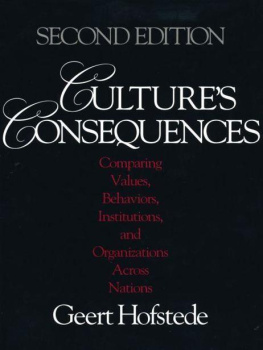Table of Contents
Copyright 2001 by Geert Hofstede.
All rights reserved. No part of this book may be reproduced or utilized in any form or by any means, electronic or mechanical, including photocopying, recording, or by any information storage and retrieval system, without permission in writing from the author or his representative.
For information:
Sage Publications, Inc.
2455 Teller Road
Thousand Oaks, California 91320
E-mail: order@sagepub.com
Sage Publications Ltd.
6 Bonhill Street
London EC2A 4PU
United Kingdom
Sage Publications India Pvt. Ltd.
B-42
Panchsheel Enclave
New Delhi 110 017 India
Printed in the United States of America
Library of Congress Cataloging-in-Publication Data
Hofstede, Geert H.
Cultures consequences: Comparing values, behaviors, institutions, and organizations across nations/by Geert Hofstede.2nd ed.
p. cm.
ISBN 0-8039-7323-3 (cloth: alk. paper)ISBN 0-8039-7324-1 (pbk.: acid-free paper)
1. Ethnopsychology. 2. National characteristics. 3. ValuesCross-cultural studies. I. Title.
GN502.H628 2000
155.89dc21
00-010498
02 03 04 05 10 9 8 7 6 5
Acquiring Editor:
Editorial Assistant:
Production Editor:
Copy Editor:
Typesetter:
Indexer:
Cover Designer:
Jim Brace-Thompson
Anna Howland
Claudia A. Hoffman
Judy Selhorst
Marion Warren
Marja Hennemann-Kloet
Ravi Balasuriya
Vrit en-dea des Pyrnes, erreur au-del.
Blaise Pascal, 1623-62
From the Preface to the First Edition (1980)
The survival of mankind will depend to a large extent on the ability of people who think differently to act together. International collaboration presupposes some understanding of where others thinking differs from ours. Exploring the way in which nationality predisposes our thinking is therefore not an intellectual luxury. A better understanding of invisible cultural differences is one of the main contributions the social sciences can make to practical policy makers in governments, organizations, and institutionsand to ordinary citizens.
Highlighting culture-dependent differences in thinking and acting is not always a welcome intervention. My general experience in discussing the topics of this book with various audiences is that the amount of international exposure within the group strongly affects the way the subject is received. Internationally experienced audiences have little trouble seeing its importance and tolerating a certain amount of introspection into their own cultural constraints. Internationally naive audiences have difficulty seeing the points, and some members even feel insulted when their own culture is discussed.
Readers of the book may go through the same kind of experiences. Multicultural readers and those who have earlier gone through one or more culture shocks in their lives may find that the book expresses in formal terms much that they already intuitively knew. For readers whose activities have so far been confined within a single national culture, the book itself may have a certain culture-shock effect: They will find question marks attached to the universal validity of much that they have taken for granted so far and of much that has become dear to them.
Nevertheless, I hope the book will find both multicultural and monocultural readers in many of the countries described and in others as well.... The book aims at a readership of policy makers in public and private organizations and scholars and students from various disciplines: comparative management, anthropology, economics, political science, psychology, sociology, comparative law, history, and social geography.
The research project which forms the basis of this book has a long history, going back to the preparation of the first international (IBM) survey in 1966. I could not foresee then that my involvement with this survey should eventually lead to my spending five years, from late 1973 to the end of 1978, on in-depth research on Cultures Consequences. Some of us in IBM suspected the scientific importance of the data as early as 1968. My colleagues of those days went on to other tasks; I alone remained to follow the intellectual track offered by this unique data base. It led me from psychology into sociology and then into political science and anthropology; it also led us to living as a family in three countries, while surviving on money from five. To a large extent it has determined our lives over the past eight years.
A preface is the place for paying tribute to ones supporters. My primary tribute goes to the [IBM] Corporation and its unnamed management, who believed us when we claimed that these were useful data to collect and who afterwards made the data available to general research; while from 1975 to 1978 they also supplied a research grant to support my work. Then there is a long list of persons who at some time contributed to the progress of the project. Among the pioneers of the IBM study I must mention David Sirota, who created many of the questions that afterwards proved so important as indicators of culture, and somewhat later Paul de Koning and Allen Kraut. There are the data processors who managed my requests for handling the unwieldy data bank for the worlds largest survey; in particular, Frits Claus and Jack Zandstra. There are the statistics experts who helped with some phases of the analysis: Peter Van Hoesel at Leiden University, Klaus Brockhoff at Kiel University, and Zvi Maimon at Tel Aviv University. There are my colleagues at the European Institute for Advanced Studies in Management at Brussels who stimulated me and acted as critical discussion partners; in particular, Alan Dale, Claude Faucheux, Andr Laurent, and Bengt Stymne. There are those who critically read through the manuscript and commented upon it: Torbjrn Stjernberg, Steven Velds (who read everything), Harry Triandis, Alberto Marradi, Robert Marsh, Seenu Srinivasan, and Wilfrid Dixon (who read parts). There is the competent staff of the European Institutein particular Gerry Van Dijck, who supplied library assistance, and my most essential supporter, Christiane Merckaert, who first turned 18 almost unreadable manuscripts into working papers and then typed the book.
Finally, there is a team of interested discussion partners and critics, experienced in multicultural living, sharing their observations, the younger among them even willing (if properly compensated) to act as research associate or administrative assistant. I mean Maaike Hofstede-Van den Hoek, Gert-Jan Hofstede, Rokus Hofstede, Bart Hofstede, and Gideon Hofstede. This is more their book than they will believe.
Preface to the Second Edition
Looking back on 20 years of consequences of Cultures Consequences , I feel like a sorcerers apprentice; after a slow start the book has become a classic and one of the most cited sources in the entire Social Science Citation Index. I never expected this; I wrote down findings that seemed obvious to me, but they proved to contain news value for others, practitioners and theorists alike, across almost any discipline that compares data from different countries. The books potential was first recognized by Walter J. Lonner and John W. Berry, who adopted it for their Cross-Cultural Research and Methodology Series. The seriess publisher, Sage Publications, also played a major role in the books success. Sages President Sara Miller McCune recognized the potential of this oversized manuscript when she first saw it in 1978, and through excellent direct marketing, Sage contributed to the wide dispersion of the books message. The series in which the first edition appeared expired in 1995, but this second edition has come of age and should be able to stand on its own feet, while still feeling the moral support of the Lonner-Berry team.












